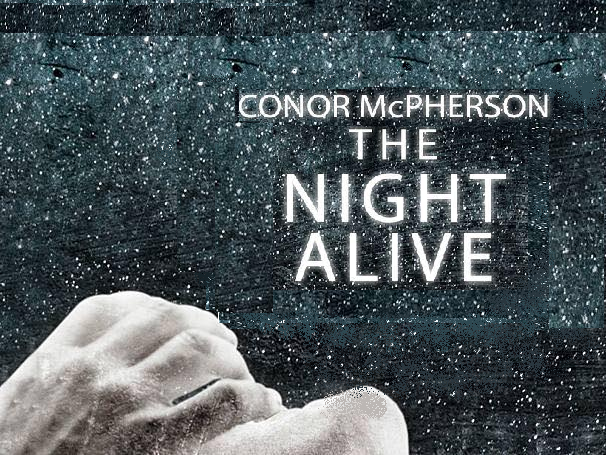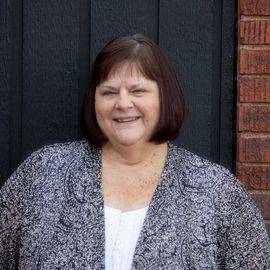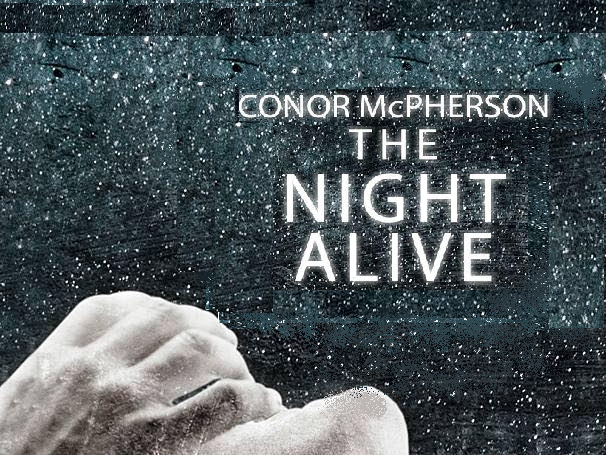
There are unlimited possibilities as to why, but it’s unquestionable that Halloween is creeping earlier every year. Pumpkin beers and Count Chocula hit grocery store shelves at the end of August, people start watchdogging for glitter skulls to go on sale at Target, fall isn’t official until the PSL hits Starbucks, and October 1st has become the launch of “one spooky thing a day” facebook posts. With all this focus on the physical aspects of a superstitious and religious dark side, it seems fitting that October’s offering at the Station Theatre has been described by its author as “a supernatural play with no ghosts.” While the good and evil inside a person has been unpacked onstage for thousands of years, it takes a playwright like Conor McPherson, and a play like The Night Alive directed by Kay Bohannon Holley, to make it haunting enough to befit the season.
 Although culturally we’ve come a long way since thinking Halloween is a night when spirits are able to return to earth, it’s not a long jump between even our modern version of the holiday and contemplation of demons, hell, and what happens when we die. McPherson is known for his intimate and often literal examinations of the wicked and the divine, sometimes including a physical devil or demon in his work. The Station’s season opener is a little more metaphorical, but only slightly. “There are forces,” says director Kay Holley, “seen and unseen, at play in this story. [They] remind us of the reality of evil and of good, the pain of thwarted potential and the reward that can come from true sacrifice.”
Although culturally we’ve come a long way since thinking Halloween is a night when spirits are able to return to earth, it’s not a long jump between even our modern version of the holiday and contemplation of demons, hell, and what happens when we die. McPherson is known for his intimate and often literal examinations of the wicked and the divine, sometimes including a physical devil or demon in his work. The Station’s season opener is a little more metaphorical, but only slightly. “There are forces,” says director Kay Holley, “seen and unseen, at play in this story. [They] remind us of the reality of evil and of good, the pain of thwarted potential and the reward that can come from true sacrifice.”
The sacrifice begins with one unusual act of kindness: Tommy, a middle-aged loser renting a room on the first floor of his Uncle Maurice’s house, steps in and rescues a young woman being beaten in the street. Bringing her home to his friend Doc, who shares the bedsit with him, they patch up Aimee, offer her a place to crash for a few weeks, and grow to care about her enough to defend her when her boyfriend Kenneth comes looking for her. Pretty straightforward, no spookiness, yet the playwright promises to present “the supernaturalism of everyday life.”
Although not all of the people in the house are family by blood, this play has all the earmarks of a “family play” or “living room drama”, with a couple little twists. Holley agrees, remarking that it does “hinge on putting a group of people in a room and seeing what shakes out.” Clearly, though, the group dynamic in this play is based off something more than related individuals with decades of shared history who resent each other for it. Although the old friends and family members do have that built-up, unknowable past, there are also new elements in the mix and a tense situation.
For me, that can spell disaster because if I want to sit in a room and listen to people yell at each other, all I have to do is show up for Thanksgiving, and that’s still another month away. Still, if there’s a point, if something is accomplished by exploring those dynamics, I am more likely to give the play a fair chance. The synopsis hints at some introspection, played out between the close friends. Even moreso, it’s been pointed out that there is quite literally “a man upstairs”, as embodied by Tommy’s uncle-landlord. Considering McPherson’s penchant for showing the close relationship between good and evil, we can assume that there may be a devil (or two) in the show, as well.
 Another positive consideration for this production is the supergroup cast. Tommy, the central character, will be played by Gary Ambler. “To be quite honest,” admits the director, “one of the things that attracted me to this play is that I knew [he] was interested in it. I knew immediately that I wanted Gary to play Tommy – he is a smart, smart actor with impeccable stage instincts.” Holley was also adamant that Lindsey Gates-Markel play opposite Ambler, as Aimee, the woman Tommy rescues; the two have a long history together as both directors and actors. Jim Kotowski ended his stage hiatus to play best-friend, Doc, and Mathew Green and David Butler round it out with smaller but vital roles.
Another positive consideration for this production is the supergroup cast. Tommy, the central character, will be played by Gary Ambler. “To be quite honest,” admits the director, “one of the things that attracted me to this play is that I knew [he] was interested in it. I knew immediately that I wanted Gary to play Tommy – he is a smart, smart actor with impeccable stage instincts.” Holley was also adamant that Lindsey Gates-Markel play opposite Ambler, as Aimee, the woman Tommy rescues; the two have a long history together as both directors and actors. Jim Kotowski ended his stage hiatus to play best-friend, Doc, and Mathew Green and David Butler round it out with smaller but vital roles.
So all of this is well and good, but at the end of the day, it’s going to be six people in and out of a room, talking, probably raising their voices at some point, possibly demonstrating (demon-strating?) some actual evil. Depending on the intensity of the situation, at any given “family play”, I have to suppress the urge to stand up mid-performance and out-shout all of them with one question:
What the hell is wrong with you?
Since McPherson tends to treat Heaven and Hell as real places, it seems even more apt for this play. So without interrupting rehearsal, I asked. And here’s what the cast answered:
Jim Kotowski (Doc) : “I don’t know!” is what Doc says during the play, when he is asked that question directly by Tommy. A non-answer, albeit an honest one, and yet he has the “deepest” thoughts and beliefs of any of the characters in the play. He believes in synchronicity and and other mystical connections, so I think he would say that, if there is anything wrong with him or with anyone, it’s that he/they are out of touch with such things.
They world, it might seem to Doc, unaccountably seems to do its best to interfere with people’s coming in contact with Divine things. Plus, I don’t think he has a good answer for why it seems to do so even more with him than with others. Nevertheless, I think that the reason Doc has been able to bounce back from major setbacks is that he feels that the “Other World” is never very far off.
The answer to “What the hell is wrong with you?” for Doc, might even be that he finds himself getting stuck in some kind of hell. As for why exactly that is, it’s as much a mystery as anything else. I do not think he is the type to waste much time on self-pity, though; he is too focused on survival, and on the next transcendent experience.
Lindsey Gates-Markel (Aimee): Aimee’s young, but she’s suffered a lot of loss. In coping with that loss, she sought solace in someone who isn’t kind to her. She’s scraping by, accepting love that isn’t love, and she has to decide if she’s ready to accept (or give) anything more. And worst of all, she’s a bit underwritten in the script, so we had to piece most of this together ourselves.
David Butler (Maurice) I think Maurice might say there’s nothing wrong with him that couldn’t be fixed with a few swallows of Jameson’s Whiskey…but even he knows that’s only a temporary solution. He hasn’t forgiven himself for the way he lost his wife, so he may be projecting a bit in his disappointment with his nephew Tommy. He’s also a bit bewildered (perhaps like a lot of people who have lived as long as he has) at the way the world has changed around him, and some of the things that have anchored him in life (the Church, for example) are either gone or not consistently reliable anymore. But I don’t think any of this makes him tragic. In fact, I really feel for the guy.
Mathew Green (Kenneth) The other characters in the play are, for the most part, all trying to do something good. They’re trying to help someone or better themselves or forgive. And then there’s Kenneth. Kenneth is a wide-awake nightmare.
—
So I have an answer to my burning question, and you have several seasonal reasons to see The Night Alive at the Station Theatre, opening Thursday, October 6th and running through October 22nd. All performances begin at 8 p.m. and Friday/Saturday tickets are $15 while all other days (Wednesday, Thursday, and Sunday) are $10. Reserve tickets online or by leaving a voicemail at the Ticket Office, 217-384-4000.








